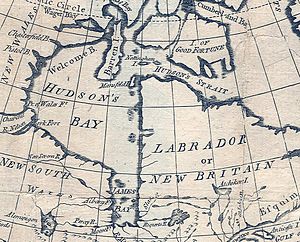Battle of Fort Albany (1709)
| Battle of Fort Albany | |||||||
|---|---|---|---|---|---|---|---|
| Part of Queen Anne's War | |||||||
 Detail from a 1779 map of eastern North America. Fort Albany is visible near the bottom. |
|||||||
|
|||||||
| Belligerents | |||||||
|
|
|
||||||
| Commanders and leaders | |||||||
| Nicolas d'Ailleboust de Manthet † | John Fullartine | ||||||
| Strength | |||||||
| 70 French militia 30 Caughnawaga Mohawk |
unknown | ||||||
| Casualties and losses | |||||||
| 18 killed | 2 killed | ||||||
The Battle of Fort Albany (about 26 June 1709) was an attack by French colonial volunteers and their native allies against the Canadian Hudson's Bay Company outpost of Fort Albany in the southern reaches of Hudson Bay. About 70 Frenchmen and 30 Indians attacked the fort, which was under the command of John Fullartine. Fullartine repulsed the attack, killing eighteen men including the leaders. He lost two men to ambush on their way back to the fort shortly after the attack.
Following the creation of the Hudson's Bay Company by English investors in 1670, a lucrative fur trade was established on the shores of Hudson Bay by the company. By the early 1680s the company had established several trading posts near the mouths of rivers entering into the bay, and Indians living in those watersheds would deliver their furs to these trading posts in exchange for provisions and European goods, including weapons, ammunition, and other items.
The success of this enterprise drew the attention of the authorities in New France, who objected to English encroachment on their claimed territories, and whose fur trade (and concomitant economic benefits) was hurt by the company's activities. Beginning with an expedition in 1686, and running through the Nine Years' War (1689–97, known in the English colonies as King William's War), raiders from New France repeatedly attacked the company's outposts, capturing and holding the facilities, and sometimes making off with furs awaiting transport to Europe. By the end of the war, only one of the company's outposts, Fort Albany (so named because it was located near the mouth of the Albany River in what is now far northern Ontario), remained in the company's hands.
...
Wikipedia
